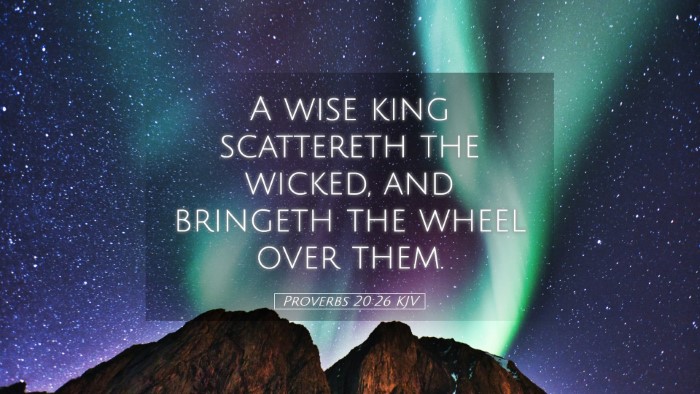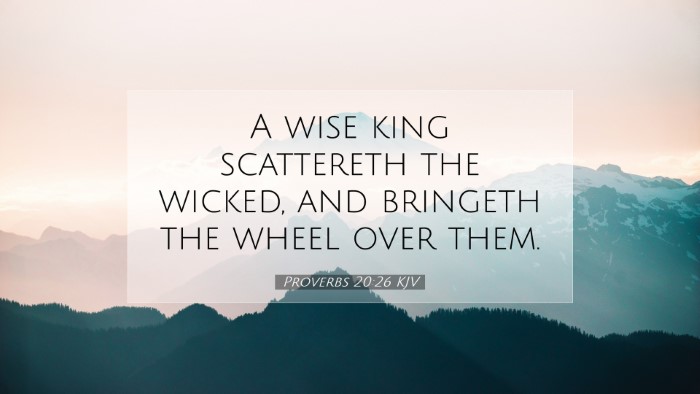Commentary on Proverbs 20:26
Proverbs 20:26 states: "A wise king scattereth the wicked, and bringeth the wheel over them." This verse invites deep reflection on the role of leadership and the moral responsibilities of those in authority. The insights provided below draw from the wisdom of well-regarded public domain commentaries, offering a multifaceted perspective suitable for pastors, students, theologians, and scholars.
Understanding the Context
The Proverbs is a book of wisdom literature attributed largely to King Solomon, known for his unparalleled wisdom and insight. Proverbs 20 navigates themes of righteousness, kingly governance, and societal order. In this particular verse, the focus is placed on the actions of a wise king and the implications these actions have for justice and moral order within the kingdom.
Exegesis of Key Terms
- Wise King: A king characterized by wisdom is one who governs not only with intellect but with a keen understanding of morality and justice. As Matthew Henry points out, wisdom in a ruler combines knowledge of right and wrong with practical application in governance.
- Scattereth the Wicked: This phrase suggests a proactive approach to dealing with wrongdoing. Albert Barnes notes that a wise king actively identifies and removes those who threaten the moral fabric of society, ensuring the safety and well-being of the populace.
- Bringeth the Wheel Over Them: This image evokes the idea of judgment and punishment. Adam Clarke reflects on how a king must ensure that justice prevails and that those who engage in wickedness face appropriate consequences, indicating the seriousness of divine order.
The Role of Leadership
The responsibilities of a leader are profound and multifaceted. A wise king not only rules with authority but also embodies the principles of justice and righteousness. Leaders are called upon to discern and address wickedness among their subjects. Henry emphatically states that true leadership requires the courage to confront evil, an act of protection for the innocent and promotion of societal good.
Furthermore, it is essential for leaders to be vigilant. Clarke warns that the neglect of justice can lead to societal decay. Therefore, a wise king must be diligent in enforcing laws and maintaining order, understanding that his decisions carry long-lasting repercussions for his people.
Moral Principles Embedded in Governance
The moral principle established in this verse is that the eradication of wickedness is paramount for the overall health of the community. Barnes emphasizes that wise governance necessitates an understanding that allowing wickedness to flourish endangers societal stability. A king who is indifferent to wickedness is ultimately unfit for leadership.
Comparison with Other Biblical Texts
Proverbs 20:26 can be compared with other biblical passages that emphasize justice in leadership:
- Proverbs 16:12: "It is an abomination to kings to commit wickedness: for the throne is established by righteousness." This reinforces the idea that a king’s foundation lies in justice.
- Ezekiel 34:4: "Ye have not sought that which was lost; but with force and with cruelty have ye ruled them." This highlights the failures of leadership that neglect justice, contrasting with the righteous king's role in mobilizing efforts for the errant.
Theological Implications
From a theological standpoint, Proverbs 20:26 introduces a framework of divine justice as it pertains to the governance of states and societies. The text underscores the belief that God’s law must be reflected in human actions, especially those in authority. Clarke posits that all human authority is ultimately reflective of divine justice, indicating that there is a higher moral law to which rulers are accountable.
The implication is profound: leaders are not autonomous; they operate under the aegis of divine law and are thereby expected to enact justice and righteousness as a testament to their faith and commitment to God’s principles.
Application for Modern Leaders
For contemporary leaders—whether in the church, community, or government—this verse serves as a compelling reminder of their moral duty to prioritize justice. Pastors may find the call to scatter wickedness to be particularly relevant as they seek to shepherd their congregations toward holiness and righteousness.
In an age where moral relativism can pose challenges to ethical governance, the admonition of Proverbs 20:26 resounds as a beacon for adherence to truths that transcend cultural shifts. Leaders must embody the spirit of this verse by being advocates for righteousness, taking necessary actions to protect their communities from moral decay.
Conclusion
In summary, Proverbs 20:26 invites reflection upon the wise king's role in promoting societal justice by confronting wickedness. Through insights gleaned from various commentaries, we observe that such leadership is essential for the flourishing of any society. The collective wisdom derived from Matthew Henry, Albert Barnes, and Adam Clarke elucidates the profound implications of this verse for both historical and contemporary contexts.
The call for wisdom in governance resonates deeply, urging all leaders to uphold justice and righteousness, ultimately reinforcing the divine order established by God. As we engage with this text, may we seek to understand the weight of our responsibilities and the imperative to act justly in all settings.


